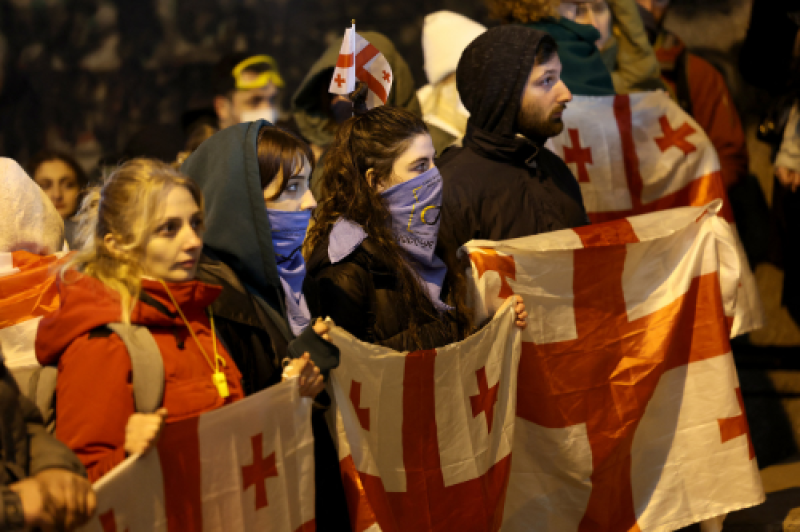- 136 new drugs in 195 essential drugs list, pricing guidelines |
- BSF halts overnight road building near border as BGB intervenes |
- U.S. Pullout From Global Bodies Sparks Widespread Alarm |
- DU Syndicate for renaming Sheikh Mujib Hall after Osman Hadi |
Numerous electoral corruption scandals tarnish free vote: TI

Protesters hold Georgian national flags during a demonstration in front of the Parliament building in Tbilisi, amid a post-election crisis. Photo- Giorgi Arjevanidze-AFP
We’re wrapping up the biggest electoral year. 2024 has been a landmark year for democracy, with voters in over 70 countries heading to the polls. While many elections were largely free and fair, this year has also been tarnished by numerous electoral corruption scandals – particularly abuses of political funding – that have undermined voters’ free will worldwide.
Take Romania, for example. Last week, the constitutional court annulled the first round of the presidential election after allegations emerged of a Russian-backed campaign to boost far-right candidate Călin Georgescu. Georgescu officially declared zero campaign spending, but there are allegations of USD$381,000 in payments to influencers to promote him. Meanwhile, in Georgia, protests continue as citizens demand transparency following the elections, which were marred by irregularities, including vote-buying and abuse of state neutrality through pressure on public sector employees.
These cases highlight the urgent need to strengthen electoral integrity. Transparency International chose this historic election year to release its new global policy position, Standards for Integrity in Political Finance. This document represents the first ever global consensus on tackling corruption risks in political financing. If implemented, these standards would serve as a safeguard against the corrupting effects of dirty, dark and disproportionate money on politics.
Our standards outline actionable recommendations to tackle corruption risks in political financing. These include rigorous bookkeeping, reporting and publication standards for income and expenses, with banks required to report suspicious activities to oversight bodies. Governments should update regulations for transparency in online advertising, ban anonymous donations and restrict foreign payments to political entities. Public financing should also be scrutinised to level the playing field in politics for marginalised groups, particularly women.
These cases of Romania and Georgia are not isolated. As we’ve warned before, weak electoral integrity is a global issue, especially when it comes to political finance.
In Mozambique, post-election protests continue after allegations of voting irregularities, with nearly 100 deaths and thousands injured. Meanwhile, in Colombia, the presidential campaign of Gustavo Petro is under investigation by the National Electoral Council for allegedly exceeding campaign spending limits by approximately USD$1.2 million. And in Japan, four out of the six of leading party factions dissolved following allegations of funnelling USD$3.4 million from fundraising proceeds, failing to report any of it.
Citizens have the right to know where the money behind their elections comes from. Unchecked money in politics allows vested interests to exert undue or illicit influence on representatives and institutions. To truly strengthen democracies worldwide, clear political finance rules which are fit for purpose, monitored and enforced are urgently needed.
It's time for a global reform to close the loopholes in political finance that allow corruption to thrive. We’re calling on the Conference of State Parties (CoSP) to the United Nations Convention against Corruption to adopt new global standards for transparency in political finance, based on our policy recommendations. We also urge governments worldwide to push for on wide-reaching reforms and align their national laws with these integrity standards.
The challenges of 2024 show just how crucial electoral integrity is for the future of democracies. Looking ahead to 2025, as the CoSP convenes in Doha, Qatar, world leaders will have a pivotal opportunity to tackle the issue of money in politics. By committing to these reforms, they can restore citizens’ trust in elections, ensuring they are free, fair and transparent. – Transparency International

